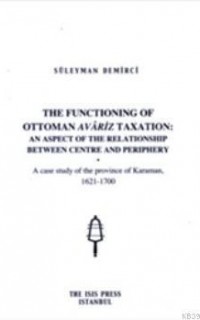
The Functioning of Ottoman Avariz Taxation; An Aspect of the Relationship Between Centre and Periphery
| ISBN | 9789754283808 |
| Yayınevi | Isis Yayınları (The Isis Press Istanbul) |
| Yazarlar | Süleyman Demirci (author) |
| Kitap Tanıtımı | This thesis uses records of a specific and major revenue source to test recent theories about the flexibility and pragmatism of seventeenth-century Ottoman financial administration, assessing how far the government was prepared to alter tax demands in line both with ability to pay and with its own requirements, whether of increased cash income or of exemptions for services provided. It addresses also the relationship between people and government as seen in the documented level of avâriz-related complaints and the way these were dealt with. It challenges the related and tenacious assumption that administrative efficiency was seriously compromise by increasing corruption amongst the government's own officials. Discussion of all these issues contributes to the debate on the nature and extent of Ottoman government authority in the seventeenth century. If the financial administration was able to develop the avâriz and nüzul taxation system into a regular annual tax, administered at a level which tax-payers were relatively happy with, and succeed in bringing the proceeds directly to İstanbul for the desired use, it must be concluded that in this aspect of administration at least, the Ottoman state remained efficient and authoritative throughout the seventeenth century. Acknowledgements Abbreviations Chapter 1. Introduction Chapter 2. Avârizhânes in the Province of Karaman, 1621-1700 Chapter 3. Avâriz and Nüzul Levies in the Province of Karaman: An Assessment of Tax Burden, 1621-1700 Chapter 4. Collectors of Avâriz and Nüzul Levies in Karaman Eyâleti: 1621-1700 Chapter 5. Complaints About Avâriz Assessment and Payment in the Province of Karaman : 1618-1700 Chapter 6. Conclusion Glossary Appendices Chronology Bibliography Facsimiles |
Kütüphaneniz